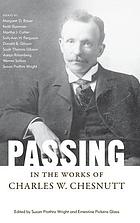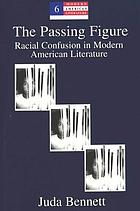From "Passing." Encyclopedia of Race and Racism, 2nd ed. 2013:
Passing, defined by novelist Nella Larsen (1891–1964) as a “hazardous business,” a “breaking away from all that was familiar and friendly to take one's chance in another environment, not entirely strange, perhaps, but certainly not entirely friendly” ([1929] 2007, p. 17), has maintained its ambiguous and controversial character unaltered through the centuries. The term is a broad semantic container comprising different ways of manipulating one's own identity. It usually refers to the practice by which a person of a given group, gender, class, age, or sexual orientation adopts the guise of another to escape discrimination or persecution or simply to attain economic, social, or psychological advantages.
 Passing in the Works of Charles W. Chesnutt
by
Susan Prothro Wright (Editor)
Passing in the Works of Charles W. Chesnutt
by
Susan Prothro Wright (Editor)
 Crossing the Line
by
Gayle Wald
Crossing the Line
by
Gayle Wald
 The Passing Figure
by
Juda C. Bennett
The Passing Figure
by
Juda C. Bennett
 "Folks are drawn to — and I’m particularly drawn to — passing narratives because they destabilize our sense of who we are. They also help us think through other categories of identity. If race isn’t as stable as we want to think about it, maybe sexuality isn’t either, or gender." - Alisha Gaines, Vox interview
"Folks are drawn to — and I’m particularly drawn to — passing narratives because they destabilize our sense of who we are. They also help us think through other categories of identity. If race isn’t as stable as we want to think about it, maybe sexuality isn’t either, or gender." - Alisha Gaines, Vox interview
 Passing
by
Nella Larsen
Passing
by
Nella Larsen
 Pinky
by
Elia Kazan
Pinky
by
Elia Kazan
 Lost Boundaries
by
Alfred L. Werker
Lost Boundaries
by
Alfred L. Werker
 Passing by Rebecca Hall (on Netflix)
Passing by Rebecca Hall (on Netflix)
(2021)
In 1920s New York City, a black woman finds her world up-ended when her life becomes intertwined with a former childhood friend who's passing as white.
